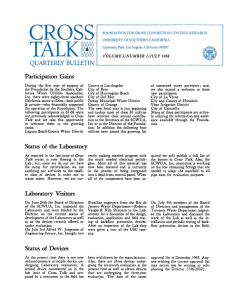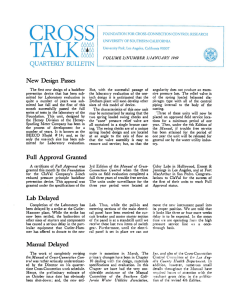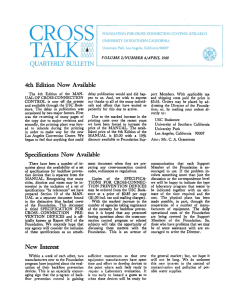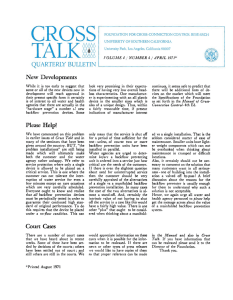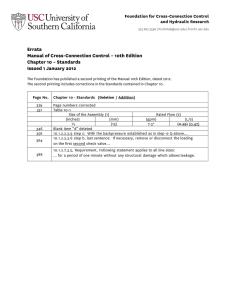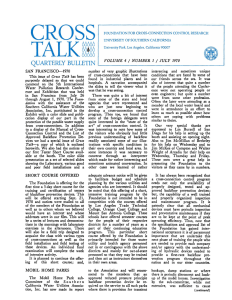CROSS TALK ~~ ~
advertisement
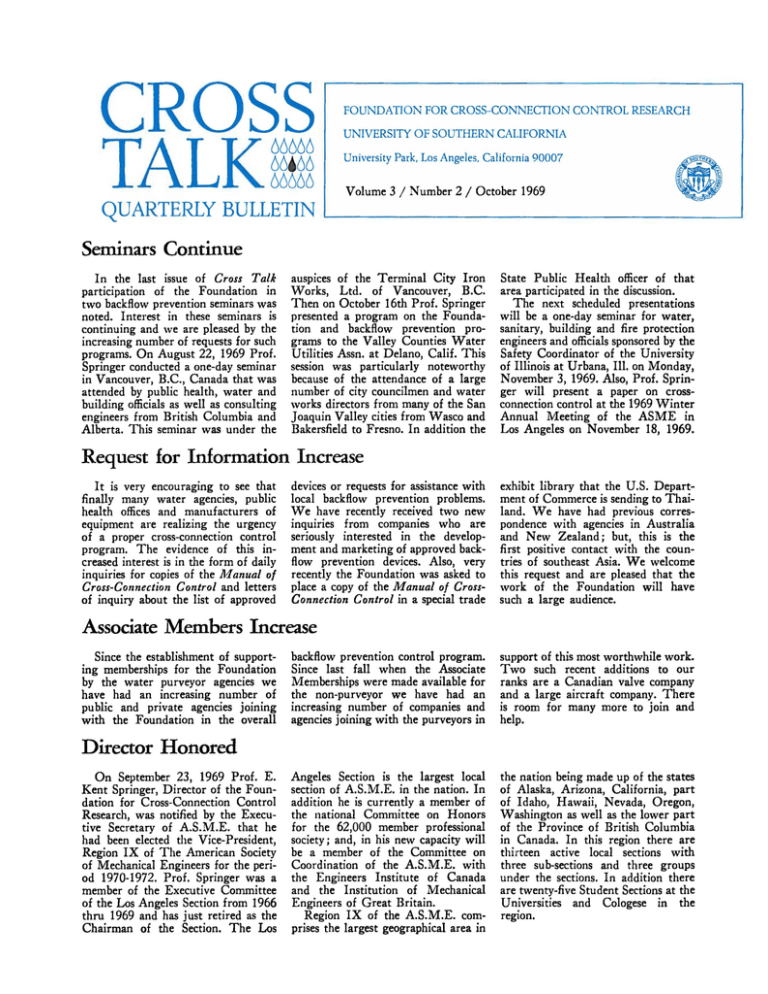
CROSS ~~~~~ TALK 66666 FOUNDATION FOR CROSS-CONNECTION CONTROL RESEARCH UNIVERSITY OF SOUTHERN CALIFORNIA University Park, Los Angeles. California 90007 Volume 3 I Number 2 I October 1969 QUARTERLY BULLETIN Seminars Continue In the last issue of Cross Talk participation of the Foundation in two backflow prevention seminars was noted. Interest in these seminars is continuing and we are pleased by the increasing number of requests for such programs. On August 22, 1969 Prof. Springer conducted a one-day seminar in Vancouver, B.C., Canada that was attended by public health, water and building officials as well as consulting engineers from British Columbia and Alberta. This seminar was under the auspices of the Terminal City Iron Works, Ltd. of Vancouver, B.C. Then on October 16th Prof. Springer presented a program on the Foundation and backflow prevention programs to the Valley Counties Water Utilities Assn. at Delano, Calif. This session was particularly noteworthy because of the attendance of a large number of city councilmen and water works directors from many of the San Joaquin Valley cities from Wasco and Bakersfield to Fresno. In addition the State Public Health officer of that area participated in the discussion. The next scheduled presentations will be a one-day seminar for water, sanitary, building and fire protection engineers and officials sponsored by the Safety Coordinator of the University of Illinois at Urbana, Ill. on Monday, November 3, 1969. Also, Prof. Springer will present a paper on crossconnection control at the 1969 Winter Annual Meeting of the ASME in Los Angeles on November 18, 1969. Request for Information Increase It is very encouraging to see that finally many water agencies, public health offices and manufacturers of equipment are realizing the urgency of a proper cross-connection control program. The evidence of this increased interest is in the form of daily inquiries for copies of the 111anual of Cross-Connection Control and letters of inquiry about the list of approved devices or requests for assistance with local backflow prevention problems. We have recently received two new inquiries from companies who are seriously interested in the development and marketing of approved backflow prevention devices. Also, very recently the Foundation was asked to place a copy of the Manual of CrossConnection Control in a special trade exhibit library that the U.S. Department of Commerce is sending to Thailand. We have had previous correspondence with agencies in Australia and New Zealand ; but, this is the first positive contact with the countries of southeast Asia. We welcome this request and are pleased that the work of the Foundation will have such a large audience. Associate Members Increase Since the establishment of supporting memberships for the Foundation by the water purveyor agencies we have had an increasing number of public and private agencies joining with the Foundation in the overall backflow prevention control program. Since last fall when the Associate Memberships were made available for the non-purveyor we have had an increasing number of companies and agencies joining with the purveyors in support of this most worthwhile work. Two such recent additions to our ranks are a Canadian valve company and a large aircraft company. There is room for many more to join and help. Angeles Section is the largest local section of A.S.M.E. in the nation. In addition he is currently a member of the national Committee on Honors for the 62,000 member professional society; and, in his new capacity will be a member of the Committee on Coordination of the A.S.M.E. with the Engineers Institute of Canada and the Institution of Mechanical Engineers of Great Britain. Region IX of the A.S.M.E. comprises the largest geographical area in the nation being made up of the states of Alaska, Arizona, California, part of Idaho, Hawaii, Nevada, Oregon, Washington as well as the lower part of the Province of British Columbia in Canada. In this region there are thirteen active local sections with three sub-sections and three groups under the sections. In addition there are twenty-five Student Sections at the Universities and Cologese in the regiOn. Director Honored On September 23, 1969 Prof. E. Kent Springer, Director of the Foundation for Cross-Connection Control Research, was notified by the Executive Secretary of A.S.M.E. that he had been elected the Vice-President, Region IX of The American Society of Mechanical Engineers for the period 1970-1972. Prof. Springer was a member of the Executive Committee of the Los Angeles Section from 1966 thru 1969 and has just retired as the Chairman of the Section. The Los It Could Have Been Here Recently the newspapers carried the unfortunate news that the entire Holy Cross football team including the student managers were stricken with infectious hepatitis and that their remaining 1969 football schedule had to be cancelled. People quite close to the problems found in and around water distribution systems were more than likely immediately aware of where to start looking for the cause of this infection. However, it is fairly safe to bet that practically all of the general public and a fair percentage of the non-technical members of the Boards and Commissioners of water utility systems would not have known where to start looking for the cause of this outbreak. The basic reason for this lack of understanding is that similar cases across the nation seldom gain such widespread publicity in the daily news. Not that such problems should be widely broadcast; but, the simple cause has probably not been vividly drawn to their attention. Furthermore, there is a natural reticence on the part of most of us to the shouting about our problems from the roof tops. However, since this unfortunate instance has been made widely public, an excellent opening is presented to all water superintendents and managers to use this as an example of specifically why a backflow prevention device is essential on even a system that to some people is harmless. Furthermore, a brief inspection tour of an area will frequently bring to light an illustration of a similar potential source of pollution in the form of a low and frequently flooded spot in a lawn or playing field. An example that the governing board can easily see and understand will be most helpful in gaining their full support for a good strong cross-connection control program. ACT NOW! Neighborly Cooparation In recent weeks a number of officials of smaller water companies and city or town agencies have been heard to remark that they are too small to engage the full time services of a properly trained cross-connection control man. Thus, they tend to argue that their company or department or district can not really engage in this type of program--even though it is really needed. To a major extent the heritage of this country has been developed by an admirable "do-it-your-self" attitude toward all of our problems. However, in recent years there seems to be a tendency to pass the buck to "Uncle." Neither solution may be the best solution for this particular problem. 666666666666666 666666666666666 666666666666666 UNIVERSITY OF SOUIHERN CALIFORNIA SCHOOL OF ENGINEI!RING UNIVERSrrY PARIC LOS ANGELES, CAUPORNA 90007 It is fully recognized that many, many smaller water companies and agencies may not have the full capability of fielding a complete crossconnection control program. But, it does appear to be very clear that most of these same companies and agencies have overlooked the possibility of cooperating with their neighboring companies and/ or agencies. An example of such cooperation can be found in two locations. In Ventura County and in Santa Barbara County there are now in operation cooperative programs where a group of five or six water companies and agencies have entered into joint agreements whereby they pool their somewhat meager cross-connection control funds to the extent that they are currently able to place a full time man in the field in each of these areas. One man may not be enough ; but, at least it is a good start in the right direction. To the many other smaller water companies and agencies it is strongly recommended that a joint program be searched out with your neighbors so that it will be possible for each to show that at least a reasonable effort is being expended toward coping with the everpresent problem of potential backflow. Non-profit Org. U. S. Postage PAID Permit No. 2075 Los Angeles, Calif.
